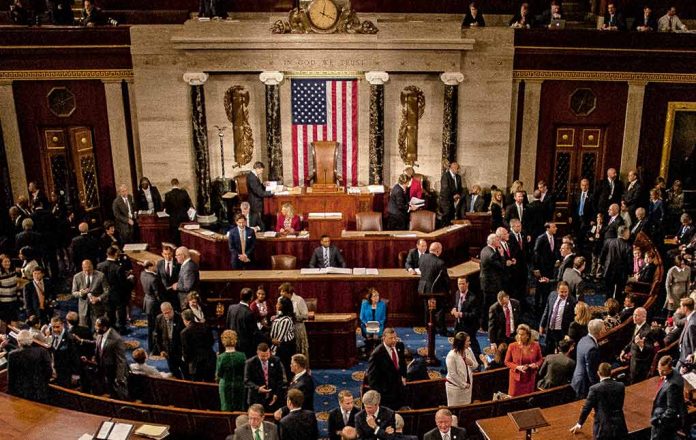
House Republicans prepare to vote on landmark legislation to curb federal judges from issuing nationwide injunctions that have repeatedly blocked President Trump’s policy agenda.
Key Takeaways
- The “No Rogue Rulings Act” would restrict district court judges from issuing nationwide injunctions, limiting relief only to parties involved in specific cases.
- The bill, introduced by Rep. Darrell Issa and supported by House Speaker Mike Johnson and Judiciary Chairman Jim Jordan, is scheduled for a floor vote next week.
- This legislation comes in response to multiple judicial rulings blocking Trump administration policies, particularly Judge James Boasberg’s halting of deportations of alleged Tren de Aragua gang members.
- Republicans are pursuing legislative remedies rather than impeachment, which faces slim chances of success due to narrow GOP majorities.
- A parallel bill has been introduced in the Senate by Josh Hawley to address what Republicans view as judicial overreach against Trump’s agenda.
Republican Backlash Against Judicial Blocks
House Republicans are advancing legislation to counter what they perceive as judicial activism hindering President Trump’s policy implementation. The “No Rogue Rulings Act,” introduced by Representative Darrell Issa, comes after significant frustration with federal judges issuing nationwide injunctions against Trump’s executive actions. This legislative effort specifically targets rulings like those from U.S. District Court Judge James Boasberg, who recently blocked the administration’s deportation of alleged members of the Venezuelan gang Tren de Aragua to Central America.
House Majority Leader Steve Scalise announced the upcoming vote, emphasizing the bill’s purpose is to rein in what Republicans view as politically motivated judicial decisions. The legislation has already cleared the House Judiciary Committee and is slated for a floor vote next week. It would fundamentally change how judicial injunctions work by limiting their applicability to only the parties directly involved in a case, rather than extending nationwide.
🚨 NEWS → Next week the House plans to vote on @repdarrellissa's No Rogue Rulings Act to limit the judicial overreach of partisan federal judges issuing political nationwide injunctions to impede President Trump's agenda the majority of American voters elected him to carry out.
— Steve Scalise (@SteveScalise) March 24, 2025
Targeting Judge Boasberg’s Recent Rulings
Judge Boasberg has become a focal point of Republican criticism after rejecting a Trump administration petition to lift his restraining order on deportations to El Salvador. The administration has used the Alien Enemies Act, a 226-year-old law, to justify deportations of alleged gang members. Boasberg’s order halted deportation flights while he considers a legal challenge brought by five Venezuelans represented by the ACLU, requiring individual judicial reviews before deportation.
While some Republicans, including Rep. Brandon Gill, have introduced legislation to impeach Judge Boasberg, party leadership appears to favor the legislative approach to curb judicial power. This strategic pivot comes after Supreme Court Chief Justice John Roberts publicly rebuked the idea of impeaching judges over disagreements with their rulings. The impeachment effort faces significant hurdles due to narrow Republican majorities in Congress.
Legislative Strategy and Support
House Speaker Mike Johnson and Judiciary Committee Chair Jim Jordan have thrown their support behind the bill, viewing it as a more practical method to address judicial decisions they consider overreach. The legislation is part of a broader strategy that includes Judiciary Committee hearings aimed at exposing what Republicans characterize as activist judges. Senator Josh Hawley has introduced a companion bill in the Senate to similarly restrict nationwide injunctions.
Republicans point to statistics showing that nationwide injunctions against the Trump administration have been issued at a significantly higher rate compared to previous administrations. This trend has frustrated the implementation of key policies, including recent executive orders on birthright citizenship that have been appealed to the Supreme Court. The bill’s supporters argue that district court judges should not have the power to unilaterally block policies enacted by elected officials across the entire country.
Constitutional Implications
The legislation raises fundamental questions about separation of powers and the proper role of federal courts in checking executive authority. Supporters of the bill argue that district court judges are overstepping their constitutional boundaries by issuing nationwide injunctions that effectively make policy. They maintain that such broad injunctions undermine the will of voters who elected officials to implement specific agendas.
Critics of the legislation, primarily Democrats, argue that nationwide injunctions serve as a critical check on executive power and that limiting this judicial authority could undermine constitutional checks and balances. With the bill moving toward a floor vote, it represents a significant effort by House Republicans to reshape the relationship between the judicial and executive branches, with potentially far-reaching consequences for how federal policies are implemented and challenged.









